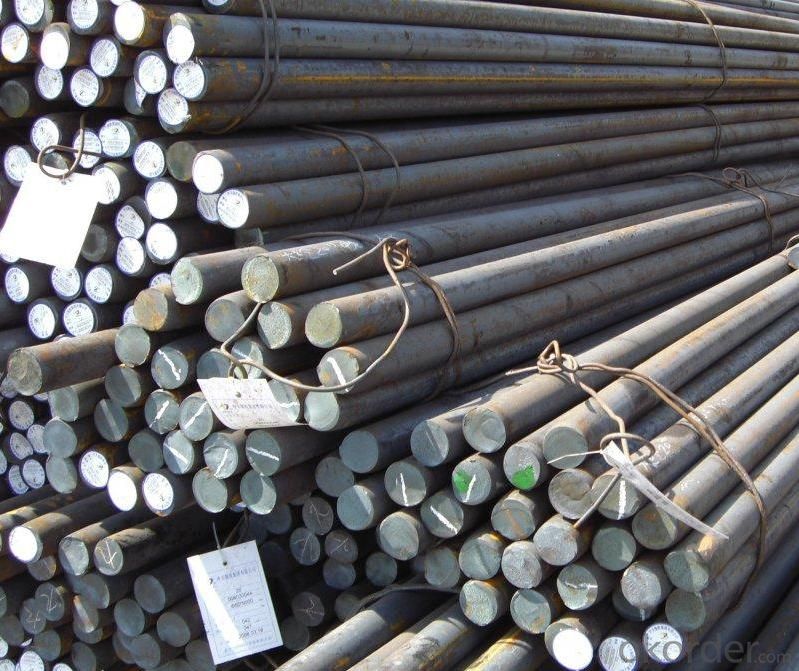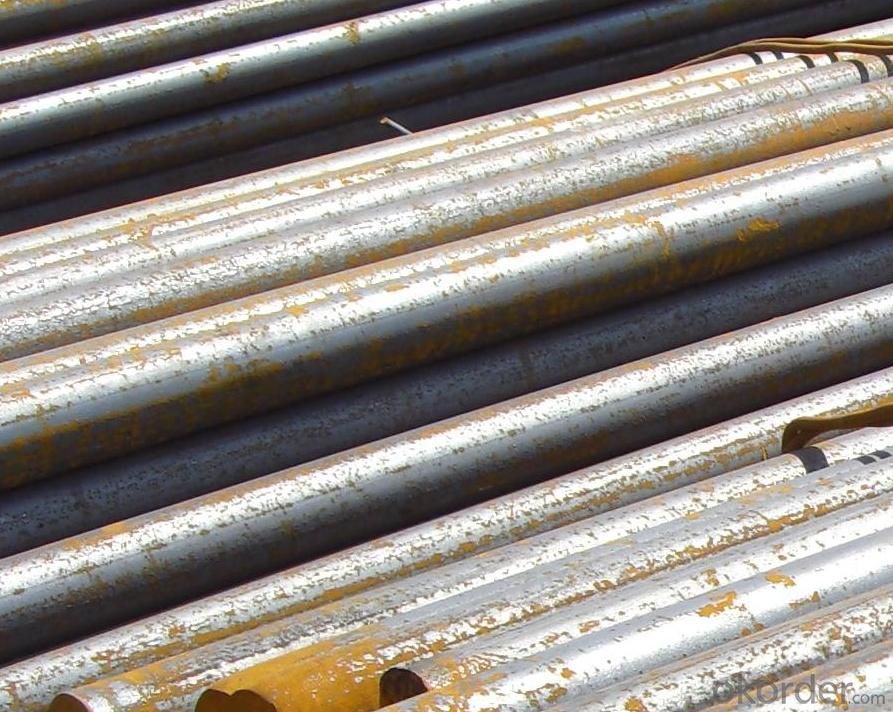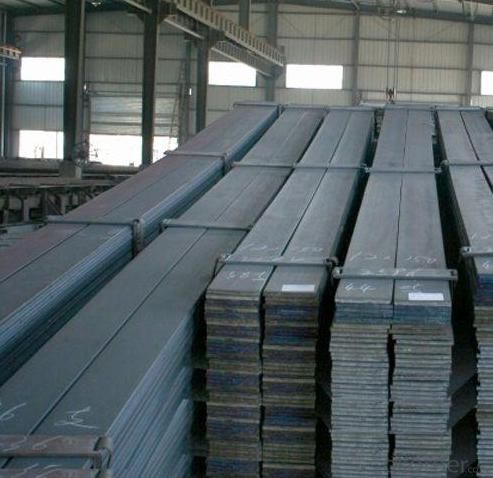20Cr Steel Round Bar SAE520 Steel Round Bar
- Loading Port:
- Tianjin
- Payment Terms:
- TT OR LC
- Min Order Qty:
- 25 m.t.
- Supply Capability:
- 50000 m.t./month
OKorder Service Pledge
OKorder Financial Service
You Might Also Like
Item specifice
20Cr Steel Round Bar SAE520 Steel Round Bar
Product Description:
1.Standard:40Cr,20Cr, 40CrMo4,SCM440,AISI4140, etc.
2.Diameter:25mm-450mm
3.Length:5.8/6m-12m or as required
4.Application:re-manufacture, structural steel etc.
5.Certificates:ISO9001:2008,ISO14001:2004,OHSAS18001
6.Packing: In bundles,Standard export sea-worthy packing or as customer's requirement
7.Shipment: by bulk or by container
8.Quality Contation
Both end of each bar must be cut.
Ladle furnanced and vacuum de-gassed
Show heat No. on each bar
Surface condition the surface of the hot rolled square bar shall befree cracks, scar and wrinkles that affect the use of the
billets. In case there is the above-mentioned defect, it shall be remove.
The mill test certificate shall show the chemical composition, and it is guaranteed that the chemical composition shall be
within the limit stipulated in the contract.
Chemical composition:
Grade | C | Si | Mn | Cr |
20Cr | 0.18-0.24 | 0.17-0.37 | 0.5-0.8 | 0.7-0.9 |
Specification:
OD | Length | Material | Standard | Technique |
16-260mm | 6-12m or aques per request | 20# | GB ASTM DIN | Hot rolled |
16-350mm | 45# | |||
200-500mm | 45# | Forged | ||
20-250mm | 20Cr,40Cr,20-42CrMo | Hot rolled | ||
50-300mm | GCr15 |
Application:
Hot rolled alloy structure steel round bar are widely used in machinery making, autombile making, railway, mine machinery, petoleum machinry, agricultural machinery and civil archtectue such as all kinds of shafts, screws, connecting rods, hardware tools, gears, standard parts, spanners fasteners, structural parts for automobile and agricultural machinery, outer and iner sleeves, rollers and balls for bearing making.
Product Show:



- Q:What are the main factors affecting the wear resistance of special steel?
- The wear resistance of special steel is impacted by a variety of factors. To begin with, the composition of the steel plays a vital role. The addition of specific alloying elements, such as chromium, vanadium, and tungsten, can significantly enhance its wear resistance. These elements create hard carbides or nitrides within the steel matrix, thereby increasing its hardness and ability to withstand wear. Furthermore, the wear resistance is greatly influenced by the heat treatment process employed. By utilizing techniques like quenching and tempering, the steel can be hardened to achieve the desired level of wear resistance. The heat treatment process also aids in refining the microstructure of the steel, making it more resistant to wear and deformation. Additionally, the microstructure of the steel is another crucial factor. The presence of fine grains and a uniform distribution of carbides or other reinforcing phases within the steel matrix greatly enhances its wear resistance. Furthermore, the existence of retained austenite, which is a metastable phase, can also contribute to improved wear resistance. Moreover, the hardness of the steel is a fundamental determinant of its wear resistance. A higher hardness level generally results in better wear resistance, as it provides resistance against the abrasive forces exerted on the steel surface. Lastly, the design and surface finish of components made from special steel also play a role in their wear resistance. The shape, size, and surface roughness of the components can impact the distribution and magnitude of the contact stresses on the steel, thereby influencing its wear resistance. In conclusion, the wear resistance of special steel is influenced by factors such as composition, heat treatment, microstructure, hardness, and the design and surface finish of the components. By carefully considering these factors, engineers can optimize the wear resistance of special steel for various applications.
- Q:How does the availability of raw materials affect the production of special steel?
- The availability of raw materials significantly impacts the production of special steel. Raw materials, such as iron ore, coal, and various alloys, are crucial components in the steel manufacturing process. A limited supply or increased cost of these materials can hinder production and result in higher production costs. Additionally, the quality and consistency of raw materials influence the final product's properties and performance. Therefore, the availability of raw materials directly affects the overall production capacity, cost-effectiveness, and quality of special steel.
- Q:How does corrosion-resistant steel protect against chemical attacks?
- Corrosion-resistant steel protects against chemical attacks by forming a protective oxide layer on its surface, which acts as a barrier against corrosive substances. This oxide layer is highly stable and prevents the steel from reacting with chemicals, thus preventing corrosion and degradation of the material.
- Q:What are the advantages of using special steel in specific applications?
- The advantages of using special steel in specific applications include its enhanced strength, durability, and resistance to corrosion. Special steel alloys are specifically developed to meet the unique requirements of various industries, such as aerospace, automotive, and construction. These alloys offer superior performance under extreme conditions, allowing for lighter and more efficient designs. Additionally, special steel can be heat-treated to further enhance its properties, making it ideal for applications that demand high strength and toughness.
- Q:What are the main factors affecting the corrosion resistance of special steel?
- The main factors affecting the corrosion resistance of special steel are the composition of the steel, the presence of alloying elements, the surface condition, the exposure environment, and the presence of protective coatings or treatments.
- Q:Can special steel be used in the transportation industry?
- Yes, special steel can be used in the transportation industry. Special steel alloys possess excellent strength, durability, and corrosion resistance properties, making them suitable for various applications in transportation, such as manufacturing of vehicle components, structural parts, and machinery. These steels can enhance the overall performance, safety, and efficiency of vehicles, ensuring long-lasting and reliable performance, even under challenging conditions.
- Q:How does special steel contribute to the aerospace turbine industry?
- The aerospace turbine industry greatly relies on special steel due to its unique advantages that cannot be found in other materials. Special steel is renowned for its exceptional strength and durability, making it perfect for enduring the extreme conditions within aerospace turbines. The demanding temperatures, pressures, and rotational speeds experienced by turbine components necessitate a material that can withstand these harsh conditions without compromising performance or safety. Furthermore, special steel demonstrates excellent heat resistance and corrosion resistance properties, which are vital for the longevity of turbine components. Its ability to resist oxidation and corrosion enables special steel to maintain its structural integrity and functionality over extended periods, reducing the need for frequent maintenance or replacement. Moreover, special steel offers outstanding machinability and formability, enabling the production of intricate and complex turbine components. This facilitates the creation of highly efficient and precisely engineered turbine blades, vanes, and other crucial parts necessary for the optimal performance of aerospace turbines. Additionally, special steel provides the necessary characteristics for enhanced fuel efficiency in aerospace turbines. By utilizing high-strength special steel alloys, turbine manufacturers can design lighter and more aerodynamic components, resulting in reduced overall weight and drag. Consequently, this leads to increased fuel efficiency and lower emissions, contributing to a more sustainable and environmentally friendly aviation industry. In conclusion, special steel plays a vital role in the aerospace turbine industry by delivering the required strength, durability, heat resistance, corrosion resistance, and machinability essential for the efficient and dependable operation of turbine components. Its contribution extends to improved fuel efficiency, reduced maintenance needs, and enhanced overall performance, establishing it as an indispensable material for the aerospace turbine industry.
- Q:What are the applications of special steel in the oil and gas supply chain?
- Special steel has various applications in the oil and gas supply chain. It is commonly used in the construction of pipelines, drilling equipment, and offshore platforms. Special steel's high strength, corrosion resistance, and ability to withstand extreme temperatures make it ideal for these applications. Additionally, special steel is used in the manufacturing of valves, fittings, and other components that are crucial for the efficient and safe operation of the oil and gas supply chain.
- Q:What are the properties of magnesium alloys?
- Magnesium alloys possess several important properties. They have a low density, making them lightweight and ideal for applications where weight reduction is crucial. They exhibit high strength-to-weight ratio, which makes them strong and durable. Magnesium alloys also have good heat dissipation properties, making them suitable for applications that require efficient cooling. They have excellent corrosion resistance, particularly when properly coated or treated. Additionally, magnesium alloys demonstrate good machinability and can be easily formed into various shapes and components.
- Q:How does special steel contribute to the aerospace noise reduction?
- Special steel contributes to aerospace noise reduction by providing high strength and durability, which allows for the construction of lighter and more aerodynamic aircraft components. This reduces the overall weight of the aircraft, leading to decreased fuel consumption and noise emissions. Additionally, special steel's unique properties, such as its ability to dampen vibrations and resist corrosion, help to minimize the transmission of noise and vibrations throughout the aircraft structure, resulting in a quieter and more comfortable flying experience for passengers and crew.
1. Manufacturer Overview |
|
|---|---|
| Location | |
| Year Established | |
| Annual Output Value | |
| Main Markets | |
| Company Certifications | |
2. Manufacturer Certificates |
|
|---|---|
| a) Certification Name | |
| Range | |
| Reference | |
| Validity Period | |
3. Manufacturer Capability |
|
|---|---|
| a)Trade Capacity | |
| Nearest Port | |
| Export Percentage | |
| No.of Employees in Trade Department | |
| Language Spoken: | |
| b)Factory Information | |
| Factory Size: | |
| No. of Production Lines | |
| Contract Manufacturing | |
| Product Price Range | |
Send your message to us
20Cr Steel Round Bar SAE520 Steel Round Bar
- Loading Port:
- Tianjin
- Payment Terms:
- TT OR LC
- Min Order Qty:
- 25 m.t.
- Supply Capability:
- 50000 m.t./month
OKorder Service Pledge
OKorder Financial Service
Similar products
New products
Hot products
Related keywords




























